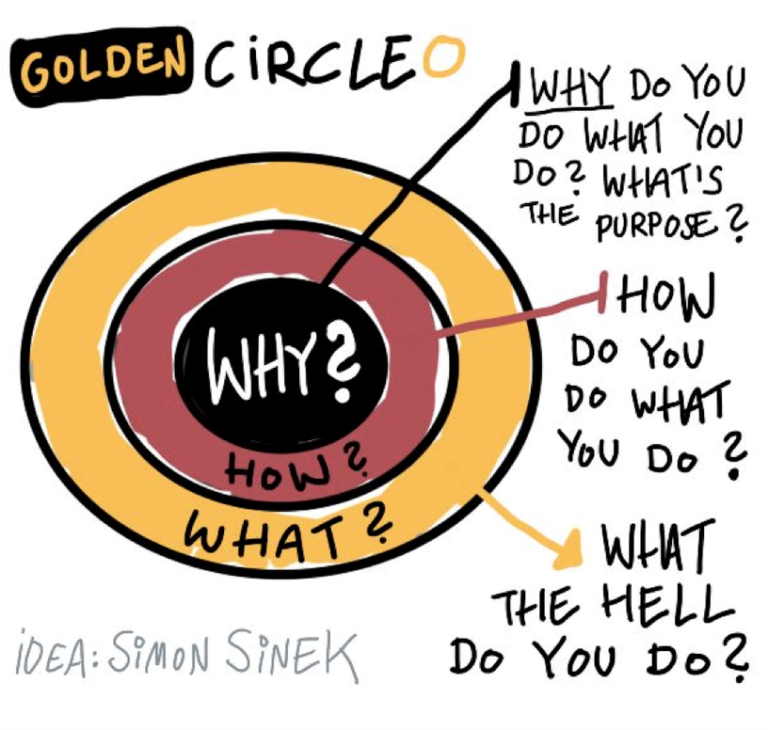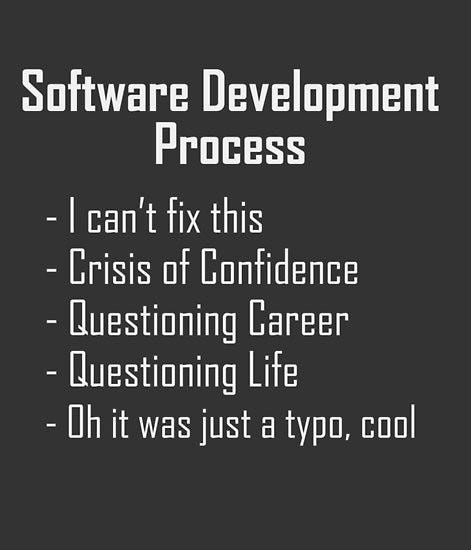Every time I tried to come up with an apt new title, a quick Google search led me to the realisation that this topic had been covered many times over and most relevant titles had been taken. I decided it was more important that the title was meaningful than unique and settled on the one above. Please do not judge me.

The reason it is still worthwhile to discuss this question is the lack of coverage of the challenging parts of changing careers, learning new skills, and signing up for a life of constant change. In this article, I will not give a list of “Top 10 Resources To Become a Data Scientist”, but I will give you an idea of my journey from a Mechanical Engineer with a basic knowledge of programming, to a Data Scientist working on Deep Learning.
Start With Why
A while back, I read Simon Sinek’s book “Start With Why”. It was at the start of my determined efforts to change careers, and it made me think hard about doing something I loved.

Image via FramingTheDialogue.com.
If you have some time, check out Simon’s Ted-Talk and come back. If you do not have time, skip ahead — it’s not mandatory.
How to Get Paid Doing Something You Love
To wake up every day excited to go to work, to work on problems that were challenging and meaningful — this was my goal, this was my Why. And, with the Why in hand, I moved on to the How and the What. It turns out, figuring out the Why is a relatively straight forward process that starts with some personal reflection. Conversely, figuring out the How and What was a more difficult process that was far from a straight line.
At the time I was working in the Oil and Gas industry and had a promising career in front of me as a project manager in upstream Oil and gas. I was even part-way through a Masters Degree in Petroleum Engineering. And, while it was interesting, I did not jump out of bed to head to work. To be sure, there were many positive parts of that job that I enjoyed. Working in a project team is a unique experience that necessitates the building of meaningful relationships, and as a very results driven person I found enjoyment in building physical projects. Unfortunately I did not find the intellectual challenges that I wanted.
I decided I would follow my interests as long as it held opportunity. Back then, Data Science was not as prevalent as it is today, but I knew data was valuable and the field was growing fast. Plus, I enjoyed working with it.
Finding myself working in remote central Australia on a two-weeks on and two-weeks off schedule, I had a sudden burst of extra time. In the evenings after working my 12-hour day managing projects, I would grab dinner, hunker in my room, and program. During the two weeks off, I would continue to develop tools for trading the stock market (something I had been involved in for a few years at the time) and started to master web scraping, data mining of both structured and unstructured data, data cleaning, data visualisation and application development.
I did not know it at the time, but this was the core part of being a Data Scientist — skills with data manipulation. None of this was being done with a goal in mind apart from making a few bucks on the stock market; I was just pursuing a personal interest. After a few years spent trading, analyzing and building tools for the Australian market, I started writing a financial column for a while my wife and I traveled the world for a year. This carried on until I headed to Germany to do a dual-degree program (M.Sc Robotics and MBA). About the same time, I also started “formally” studying Data Science on my own.
It helped that I had studied calculus, linear algebra, and differential equations during my engineering degree. I had some experience with C++ and Matlab, but I could not call myself a programmer. I also think the raw math skills needed to be a Data Scientist are not that complex.A few primers on Khan Academy and a few videos on YouTube are enough to make you dangerous.
My studies continued, somewhat obsessively. I would get up in the morning and study for 2–3 hours and then go to school. With the dual degree, I had planned on building a solid foundation to change careers. It came with a scholarship; it was the famous German engineering world, it was a no-brainer. At the same time, I could study Data Science on the side.
It turned out that I hated going back to school. The structure, the inflexibility, and the lack of anything related to Data Science bothered me. To be honest, I was never a huge fan of structured learning and was enjoyingcharting my adventure through the Data Science world. I have nothing against the university or the students; it just was not what I wanted to do. I was studying Finite Element Analysis and Materials Engineering at school, and all I wanted to do was go back to studying Machine Learning. It was a fascinating subject, and the possibilities were incredible.
Thinking back to Mr Sinek’s words and the “Why” that I had started this journey with, I felt that school was not going to get me there. Sure, it would lead to an interesting career — but I just did not love it. After a few late evenings talking with my wife, I dropped out of both programs and started a job as a Data Analyst. It was the first step in getting paid to work with Data, and I would continue to study Machine Learning in the evenings.
As the months progressed, I studied more. All my spare time was spent studying, coding, learning. I learned Spark, Python, studied most conventional Machine Learning methods, learned to understand Neural Networks in all their detail and began building my own projects. My wife and I moved to Bulgaria where I would start a consultancy, and I continued to study with a focus on Deep Learning.
There were two motivating winds behind me.
- If I want to work with the most interesting people and on exciting problems, I need to be at the cutting edge of this field.
- I get up every morning excited to learn something new in my chosen field.
In hindsight, it was not that hard to keep going. I was driven by both an interest and a paranoia. Always thinking that I do not know enough, I continued studying. Plus, I was having fun, so it did not feel like work.
Eventually, I got up from my books and found myself relatively well versed as a Data Scientist. It had been about four years since the first days programming. My jos allows me to work on cutting-edge Deep Learning models. We implement new model designs that may have come out in the last month and are starting to produce new unique ideas.
A Few Notes About Starting With Why
I wanted to pause for a bit here to clarify my Why, How and What:
- Why — I want to wake up every day excited to go to work so my life would be more fulfilling.
- How— Find a career in a field that fascinates me, work with driven and interested people on interesting challenges, and work on the cutting edge of that field.
- What — I happen to be a Data Scientist
Data Science was never the goal. If you start your journey with the decision to become a Data Scientist, you might become a good one. You also might find out you hate it. Are you willing to spend two weeks cleaning data from ten sources, feature engineering for another week, and then testing your model to realise it is worthless?
Are you willing to understand the nuts and bolts — the math, the concepts, how optimisation works? Are you going to spend your time studying early in the morning and late at night while your friends go to the bar and progress through their high paying engineering careers?If not, then Data Science (probably) is not for you. I say probably because there are always exceptions. I try to set high standards for myself that may not necessarily apply to others so take this with a grain of salt.
Fighting The Current
As a field, Data Science is rapidly changing. The deeper you go, the harder it gets to keep up. You need to be committed to learning and studying, and still willing to go back to those first principles and wrestle with the data. You need a dizzying array of technical, analytical, and personal skills. The day you stop studying is the day you start falling into obsolescence. Imagine how exhausting that could be if you do not love what you are doing.
Meritocracy
Data Science has, thus far, been more meritocratically based than credential based. It opens the field to many different people and attracts people that enjoy it much more than other fields. This side of Data Science is falling a bit by the wayside as Universities catch up to charge people for formal degrees — Not that there is something inherently wrong with that, but it draws people into a field that otherwise would not have spent the time on their own. In a field like Data Science, it is hard to keep up if you do not love it. Without drive, you will find yourself quickly falling behind.
Data Science is Hard and Frustrating

Being a Data Scientist, just like being a Software Engineer, can be incredibly frustrating, hard, and a considerable time investment, but it is a very rewarding. That being said, it may not fulfill your Why. For most people, it most certainly does not. I implore you to start with Why rather than What.
Follow your interests where those interests also contain opportunity. It may not be Data Science (and statistically it is not), but you will find something if you are dedicated. Learn every day and focus your effort on where the opportunities lie. If you do that, you will be rewarded with an exciting career that makes your life all the more meaningful.
I am confident the right approach can lead anyone to fall in love with their career.
This post was originally published on Towards Data Science on Feb 9, 2018: To Be or Not to Be (A Data Scientist).
